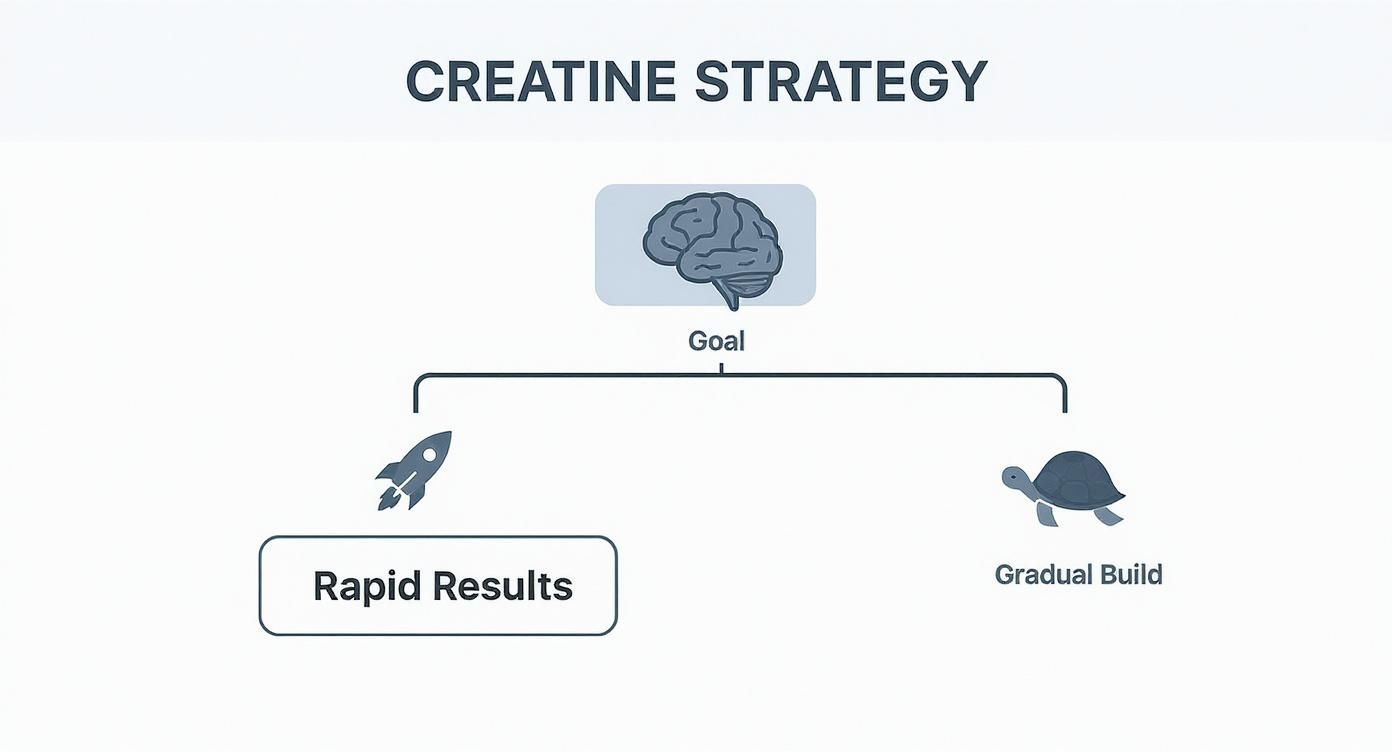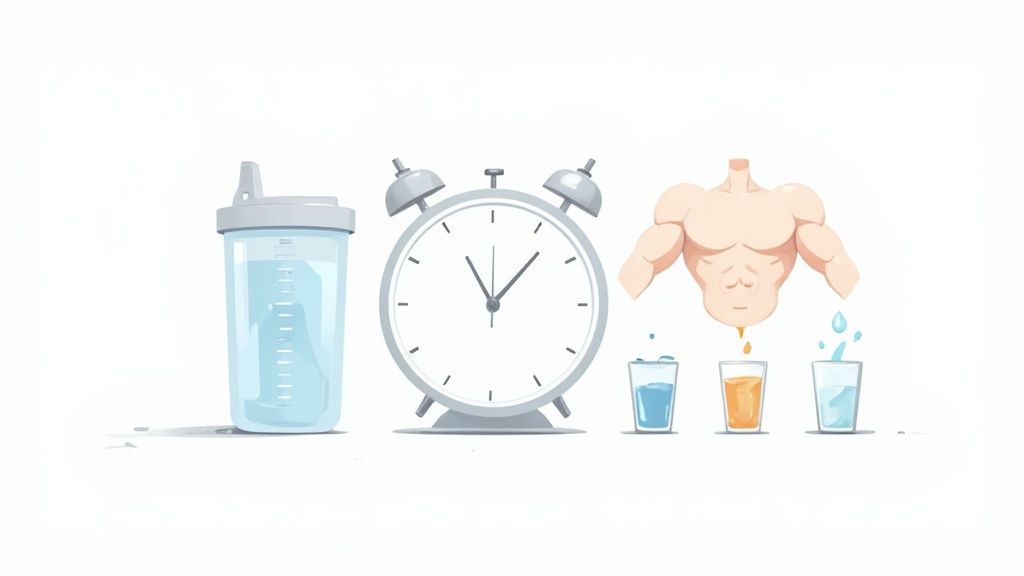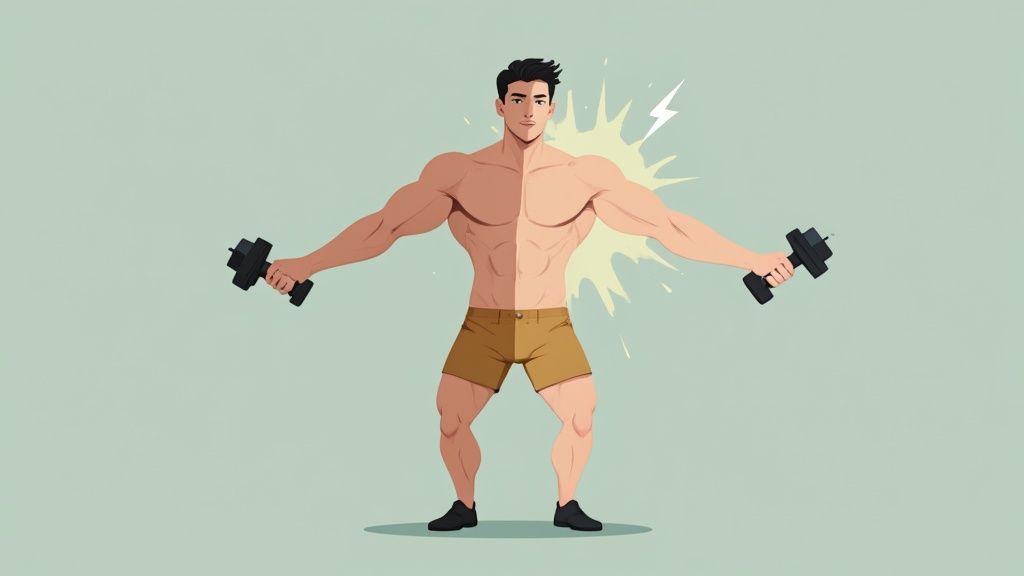Unleash Your Inner Beast: How to Use Creatine Effectively for Maximum Gains
Posted by Maximus
on
Ready to unlock the secret of how to use creatine without getting tangled in confusing gym-bro science? Fantastic. This is way easier than you've been led to believe. Ditch the complicated protocols and mythical "timing windows." Tapping into this supplement's full power boils down to one simple choice you make right now.
Let's cut right to the chase. You've got two main paths to start your creatine journey, and here's the kicker: they both lead to Gainsville. The only real difference is how fast you want to get there.
Think of it like fueling a race car. You can either slam the gas pump nozzle in and fill it up at lightning speed, or you can go with a slow, steady trickle. Either way, the tank ends up full. Your muscles are that high-performance engine, and creatine is the rocket fuel.
So, what's it gonna be? The express lane or the scenic route?
The Loading Phase (The "I Want It Now" Method): This is for the impatient warriors among us (no judgment, we get it!). You'll hammer a higher amount for a short period to "load" your muscles and saturate them fast. We're talking 20 grams per day, split into four easy 5-gram servings, for about 5-7 days. This method gets you to peak creatine levels in a flash, perfect if you've got a competition breathing down your neck or you just want to feel that power surge ASAP.
The Maintenance Dose (The "Slow and Steady" Method): This is the chilled-out approach. Just skip the high-octane loading week and start with a daily dose of 3-5 grams. It'll take longer to fully saturate your muscles—around 3 to 4 weeks—but you'll get to the exact same powerhouse destination in the end. This is the perfect option if you have a sensitive stomach or just want a dead-simple routine.
Deciding which path to take is your first mission. To make it even easier, here's the cheat sheet.
This table will help you decide which starting method fits your goals and personality best.
| Strategy | Daily Dose | Duration | Best For | Key Benefit |
|---|---|---|---|---|
| Loading Phase | 20g (split into 4 doses) | 5-7 days | Quick results, athletes with upcoming events | Fastest muscle saturation |
| Maintenance Dose | 3-5g | Ongoing | Long-term use, sensitive stomachs | Simple, fewer potential side effects |
No matter which strategy you pick, you'll eventually land on a daily 3-5 gram maintenance dose to keep your power levels maxed out.
The real secret? The one rule to rule them all? Consistency is king. Whether you load or not, taking your creatine every single day—yep, even on rest days—is the only thing that truly matters. This keeps your muscles locked, loaded, and ready to dominate.
Ultimately, the best way to understand how does creatine work is to stop reading and start doing. Pick a method, stay consistent, and get ready to experience the hype for yourself.
Alright, let's settle the great creatine debate: should you "load" it like you're cramming for a final exam, or take the slow and steady route? This is the first big decision you’ll make, and it’s not about right vs. wrong. It's about what fits your goals, your timeline, and your gut.
Think of it like this: The loading phase is the bullet train to Gainsville. The goal is simple and aggressive: max out your muscle's creatine stores as fast as humanly possible. This is the old-school gym protocol you’ve probably heard whispered around the squat rack, and it works.
If you decide to load, you're signing up for a higher dose—typically 20 grams per day—for about a week. You'll want to split this into four 5-gram servings throughout the day to make it easier on your system and maximize absorption.
Why the rush? It vaporizes the time it takes to fully saturate your muscles. We're talking 5-7 days instead of a full month.
This strategy is your ace in the hole if you've got a deadline. Maybe you’re an athlete with a competition fast approaching, or maybe you're just plain impatient and want to feel that extra pop in your lifts now, not next month. It’s a scientifically-backed shortcut. Most of the big studies on creatine kick off with a loading phase of around 20 grams per day for 5 days, which is a big reason why it’s considered the gold standard for effective creatine use.
The only potential catch? Some people report a bit of stomach discomfort or bloating from the high initial dose. It’s usually temporary, but that’s the toll for the express lane.
Now for the scenic route. The maintenance-only approach is as brutally simple as it gets. You just skip the high-dose week and start with a standard 3-5 grams per day from day one. It's the marathon, not the sprint.
This method gets you to the exact same destination—fully saturated, performance-ready muscles—it just takes a little longer, usually about 3-4 weeks.
This is the go-to choice if you're not in a hurry, you value a dead-simple routine, or your stomach throws a fit at the thought of the loading protocol. You still get all the awesome long-term benefits, just without the initial intensity.
Here’s the deal: Both methods work. Loading gets you there faster; maintenance is simpler and gentler. The best choice is the one you can actually stick with consistently.
Still on the fence? Let this awesome decision tree be your guide.

The visual sums it up perfectly. If you want an immediate impact, the rocket ship (loading) is your ride. If you're playing the long game and prefer a gradual build, the turtle (maintenance) will still win you the race.
Once you've picked your path, you need the right fuel. We poured our expertise into creating the ultimate weapon: Crazy Muscle Three-Atine on Amazon. It gives you three elite forms of creatine in one scoop, so your muscles get everything they need to grow. Grab yours now and feel the difference.
Alright, you've got your dose locked in. That's half the battle. But if you want to squeeze every last drop of power out of every scoop, we need to talk about the details—the little tricks that separate good results from legendary ones.
This is about transforming your daily creatine habit into a high-performance ritual.

So, what's the magic window for taking it? Should it be part of your pre-workout hype-up, or is it better for post-workout recovery? Let’s put this argument to bed for good.
You've probably heard it all on this one. Some lifters swear by chugging creatine right before they touch a weight, thinking it’ll give them an immediate power boost. Others won't even look at their shaker bottle until after their last brutal rep.
The real answer is… it doesn't matter that much.
While some studies whisper that taking creatine post-workout might give you a tiny edge for building muscle, the difference is minimal. The logic is that your muscles are like hungry sponges after you train, ready to soak up every nutrient you throw at them.
But here’s the bottom line: the most important thing isn't the exact minute you take it, but that you take it every single day. If tossing it in your post-workout shake is easy to remember, do it. If you prefer it with your morning coffee to start the day like a boss, that’s just as awesome.
For a deeper dive, check out our full guide on the best time to take creatine.
The biggest takeaway? Stop staring at the clock. Find a time that works for you and make it a non-negotiable part of your daily warpath. Consistency is the secret weapon.
This part is not a suggestion. It's a command. Seriously. Creatine performs its magic by pulling water into your muscle cells. This process, called cellular hydration, is what gives you that full, powerful look and feel.
If you’re not drinking enough water, you're kneecapping your results. Even worse, you're inviting side effects like stomach cramps or dehydration. It’s like owning a monster truck and putting tricycle wheels on it—you're just not going to get the performance you paid for.
As you build your creatine habit, remember that maintaining proper hydration during exercise is a game-changer. A good rule of thumb is to aim for at least a gallon of water throughout the day. Your muscles will thank you.
So, what’s the best liquid to mix your creatine with?
Honestly, plain old water works perfectly. If you've got a high-quality powder that dissolves easily (like ours!), you don't need any fancy concoctions.
Now, you might have heard that mixing creatine with carbs can help with absorption. The idea is that the carbs spike insulin, which then acts like a key, unlocking your muscle cells to let more creatine flood in. It's true, but for most people, the effect is minor.
Here are a few easy ways to mix it:
One final pro-tip: don't mix your creatine and let it sit around all day. It can start to break down in liquid over time. Mix it up, and drink it down. It’s that simple.
Think creatine is just a one-trick pony for your muscles? Think again. While it's famous for fueling epic gym sessions, one of its most insane—and criminally underrated—benefits is what it does for your brain. This isn't just about a stronger bicep; it's about a sharper, faster, more resilient mind.
Your brain is an absolute energy glutton. It devours a massive chunk of your body's resources just to keep the lights on. Just like your muscles, your brain runs on a form of cellular energy called ATP. And what’s the secret sauce for rapidly recycling that ATP? You guessed it—creatine. It basically acts as a charging station for your brain cells, keeping them firing on all cylinders when you need them most.

This mental fuel becomes a legit superpower when you’re under pressure. Whether you're pulling an all-nighter for an exam or navigating a high-stress project at work, creatine can be your secret weapon against mental burnout.
The science backs this up in some seriously cool ways. For instance, recent research showed that a single high dose of creatine helped participants crush it through 21 hours of sleep deprivation. That's insane. It didn't just improve their cognitive processing speed; it also helped maintain stable energy levels and pH in the brain, essentially armor-plating it against the metabolic stress of pure exhaustion.
This has huge implications for anyone looking for a mental edge:
By making sure your brain has the energy reserves it needs, creatine supplementation helps you perform at an elite level when it really matters, turning mental marathons into manageable sprints.
Because of these effects, creatine is finally getting the recognition it deserves as a powerful nootropic—a substance that can improve cognitive function. It's not a jittery stimulant like caffeine. Instead, it provides the raw, clean energy your brain needs to operate at its absolute peak.
The big takeaway here is that peak performance isn't just physical. A brain running on a full tank is just as crucial as muscles primed for the next set. Creatine fuels both, making it a truly dual-purpose supplement.
Beyond just a performance enhancer, creatine can support long-term brain health as part of a larger wellness strategy. For a broader look at how different interventions can support mental acuity, you might explore functional medicine approaches to addressing cognitive decline.
Whether you're looking to build your body or sharpen your mind, adding a quality creatine supplement is one of the smartest moves you can make. It’s an investment in your total domination, inside and out of the gym.
https://www.youtube.com/embed/PFg16I_iJyA
Let's cut through the garbage. For every person who swears by creatine, there's someone else whispering completely bogus rumors about it in the locker room. From making you bloated to wrecking your kidneys, the myths are enough to scare anyone off.
So, let’s clear the air and put these tired concerns to bed once and for all.
First up, the big one: bloating and water retention. Yes, creatine absolutely pulls water into your muscle cells—that's a huge part of how it works its magic. This initial "cellular hydration" might cause the number on the scale to tick up a bit, but it’s water inside your muscles. Think fuller, more pumped-looking muscles, not a puffy, bloated gut.
Honestly, most of the stomach issues people complain about come from cheap, gritty powders that don't dissolve well. A premium blend, like our Crazy Muscle Three-Atine, mixes so smoothly that stomach drama is basically a non-issue as long as you're drinking enough water.
Next, the age-old question of "cycling." Do you need to go on and off creatine? The short answer is no. This isn't a steroid. Your body doesn't build up a tolerance to it. Consistent use is what keeps your muscle stores topped off and ready to unleash hell. If you stop, you'll just have to go through the whole saturation process again when you decide to get back on it. Why bother?
This is a huge question we get all the time. You've been taking 5 grams a day like clockwork, but you're not suddenly benching an extra 50 pounds. What gives?
Here’s the deal: creatine isn’t a magic pill. It’s an amplifier for the blood, sweat, and tears you’re already putting in.
If you're just phoning it in at the gym, you can't expect mind-blowing results. Creatine is designed to give you the fuel to push for that extra rep or two, lift a little heavier, and recover a bit faster. It's in that extra effort, that grind, where the real growth happens.
In fact, some evidence suggests that just taking the standard dose isn't a silver bullet. A recent controlled trial found that 5 grams of creatine daily didn't significantly increase lean muscle mass over 12 weeks beyond what exercise alone provided. This proves that your dosage and, more importantly, your training intensity are what truly matter. You can read more about these findings on creatine effectiveness.
The bottom line is simple: Creatine rewards hard work. It won’t lift the weights for you, but it will absolutely give you the power to lift them yourself, harder and more often than before.
Finally, let's squash those scary health warnings. After decades of relentless research, creatine has proven to be one of the safest and most-studied supplements on the market for healthy individuals. When used as directed, it does not harm your kidneys. End of story.
For a complete breakdown of what to expect, you can explore the many proven benefits and side effects of creatine monohydrate. With the myths busted, you can finally supplement with total confidence.
We get it. You've heard the whispers in the locker room, scrolled through conflicting advice online, and now you just want some straight, no-BS answers. Let's cut through the noise and tackle the biggest creatine questions head-on so you can start supplementing like a pro.
Let’s keep this brutally simple: creatine monohydrate is the undisputed king, champion, and GOAT of the creatine world. It’s been studied more than any other sports supplement on the planet, and for decades, it has consistently proven its worth for cranking up strength, power, and muscle growth. It just works.
Unless you're one of the rare few who get an upset stomach from it, there’s zero reason to shell out extra cash for fancy, "advanced" forms. Stick with the gold standard. Our own Three-Atine formula is built on a rock-solid foundation of trusted monohydrate, blended with two other forms just to cover all your bases and maximize results.
Nope. Absolutely not. The idea that you'll shrivel up and lose the actual muscle tissue you busted your butt for is a total myth.
Here's what really happens: when you stop taking creatine, your muscles gradually release the extra water they were holding. This might cause a small drop on the scale and you might look a little less "full" or pumped. But the hard-earned muscle itself? That’s yours.
Think of creatine as the scaffolding that helps you build a skyscraper. Once the building is up, you can take the scaffolding down, and the structure remains. The strength and lean tissue you gained are yours to keep, as long as you keep training like an animal and eating right.
Yes, 100%. This one is non-negotiable if you want the best results.
Consistency is everything. The whole point of taking creatine is to keep your muscle stores fully saturated—completely topped off—so they're primed and ready for your next workout. Taking that 3-5 gram maintenance dose every single day, especially on your much-needed rest days, ensures your power levels never have a chance to dip.
This keeps the recovery and preparation process humming along in the background. Don't skip it.
Ah, the zombie myth of the supplement world. This one just refuses to die, no matter how many times it's been shot in the head.
The entire rumor mill started because of one small, ancient study. It found that creatine raised levels of a hormone (DHT) that's linked to male pattern baldness, but here’s the crucial part: it never actually measured hair loss.
Since then, a mountain of direct studies have looked for a connection and found absolutely nothing. Zero link between creatine supplementation and increased hair loss. No significant changes in testosterone or DHT.
The scientific consensus is crystal clear: creatine does not make your hair fall out. If you're genetically prone to thinning hair, that's the real culprit, not the awesome powder in your shaker cup.
Hopefully, that clears things up! When you're ready to stop messing around and add a proven, high-quality creatine to your arsenal, check out the full lineup from Crazy Muscle over on our official Amazon store. It's time to get to work.